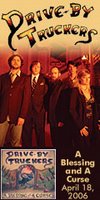
It will tell you something about my taste in reading material when I say that I’ve read quite a bit of sniping about Dwight Yoakam over the last few years. Long banished from the mainstream Country Music machine, Yoakam has spent much of the last five years in transition, primarily the result of his split with longtime record label Reprise. Over the last decade, Yoakam has released as many “filler products” (i.e. live albums, cover albums, b-side compilations, greatest hits packages, etc.) as proper studio albums. As a result, it has become difficult to filter through a deluge of material and decide whether Yoakam is still a cutting-edge country artist or a respectable touring musician with a distinguished catalog of work. You’d be forgiven for presuming the latter, but a close examination of those studio albums might convince you otherwise. Indeed, his final string of albums for Reprise –
This Time, Gone, A Long Way Home and
Tomorrow’s Sounds Today – might have seemed comfortable in their familiar skins, but they captured Yoakam at the top of his game. Box sets and soundtracks notwithstanding, only his first post-Reprise release
Population Me had the faint whiff of been-there-done-that.
Now comes
Blame the Vain distributed by New West Records, an independent label that just may have enough marketing muscle to put Yoakam back on the musical map. If marketing muscle won’t quite do it, Yoakam’s blistering return to form ought to grab the attention of those who’d written him off. Ironically (or perhaps not at all), it is Yoakam’s first effort without guitarist/producer Pete Anderson at his side, and the results, while not radical in any way, certainly feel reinvigorated. Some of the difference resides simply in the mixing choices – less Telecaster up front and more balance of keys, vocals and percussion. However, there are notable arrangement choices evident as well – a piano solo perhaps where a guitar solo would have previously sufficed. Not to diminish Anderson’s prior contributions in any way, but it seems that Dwight (who self-produces here) was paying close attention during their many years working together.
Yoakam shrewdly keeps his more experimental notions in check. For instance, the Moog’ed-out intro to “She’ll Remember” – which frighteningly (but amusingly) features Yoakam in spoken faux-British monologue – carefully avoids overstaying its welcome and bleeds into perhaps the best song on the record. “She’ll Remember” features a complex rhythm change, something of a Yoakam trademark. However, here the change doesn’t really alter the tempo of the song (like so many songs that use this technique) but instead adds depth and complexity to the arrangement. If some of Yoakam’s subtler techniques are lost on you, skip ahead to this track to see why Dwight is still one of Country’s true innovators 20 years into his career.
Yoakam has never been shy about his British Invasion and punk influences (he’s covered The Kinks and The Clash) but for maybe the first time these influences are stamped all over the record: the galloping percussion intro of “Intentional Heartache”, the George Martin-esque orchestral arrangement on “Last Heart in Line”, the bright wave of Mick Jones-like guitar on “When I First Came Here”. The whole album is imbued with a complete lack of self-consciousness, neither stretching beyond Yoakam’s abilities nor comfortably resting on his established sound. If there was any justice in the Music Industry,
Blame the Vain would shoot to the top of the Country charts and release Nashville from the iron grip of Toby Keith, Big & Rich and oh-shit-here-she-comes Carrie “American Idol” Underwood. But yeah, I know…
David Cantwell of
No Depression magazine once claimed that Dwight Yoakam’s rendition of “Tired of Waiting” (from his
Under the Covers album, featuring a big band arrangement of The Kinks classic) was one of the worst things he’d ever heard put to record. That was one of the first critical punches thrown at Yoakam, who fired off that covers record, a live album and a Christmas album all within the course of a couple of years. Considering those recordings (none half as bad as Cantwell claimed), it was easy to lose track of, say,
A Long Way Home, also released during that stretch of work. If Yoakam can be faulted for anything, it has been releasing so much product that the true albums got lost in the mix. If this has created an impression that Yoakam has lost a step here or there, so be it.
Blame the Vain might be either a response to those critics or a rousing kiss-off to them. But in either case, you can bet on this: you won’t hear too many records this year – country or otherwise – that can stand toe-to-toe with this instant classic.
P. S. In Cantwell's defense, he also reviewed A Long Way Home for No D. and gave it a fair (if slightly lukewarm) review. I don't mean to paint him as a Dwight-hater or anything. But if you ever stumble across his review for Under the Covers, check it out. It's a classic of pure critical vitriol.
 Track listing:
Track listing: 




